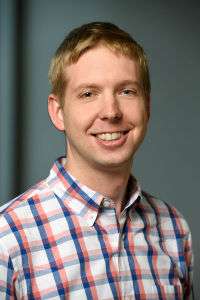
Q&A: Josh Peterson
January 18, 2019
Bloomberg Fellow Josh Peterson sort of “backed into” public health. He started as a history major in college and later worked at YMCA of the Greater Twin Cities, helping young people on probation access mental health services and advance their educations.
Today, Josh works for the Minneapolis Health Department, where he oversees a portfolio of youth violence prevention programs. At the health department, Josh quickly realized he was drawn to public health approaches that address the issues underlying violence and employ data and testing to find solutions.
We talked to Josh, now a part-time MPH student at the Johns Hopkins Bloomberg School of Public Health, about what’s unique about teens and how Minneapolis is steering young people away from violence.
Why do you work with teenagers?
Young people are our future. In many ways they are our present too. They bring a wisdom to conversations in the world that adults have lost. They show a resilience and spirit that we can all learn from. They deserve to be listened to, and too often they aren’t.
And often there are barriers young people face, and they’re expected to know how do deal with them. Something that stood out when I was working with 18-, 19- and 20-year-olds was that a lot of young people that age look like adults, sound like adults and act like adults. So, people expect them to make decisions like adults.
But the reality is that the rational part of the brain doesn’t fully develop until about age 25, so it’s not always fair to expect 18-,19-, and 20-year-olds to make decisions the same way adults do. That disconnect between expectation and reality can lead to challenging situations for young people. So, it’s important to give them the support they often need as they navigate difficult barriers while also working with adults to make sure they understand young people.
Tell us about some of your violence prevention work in Minneapolis.
We've been doing youth violence prevention work broadly since 2006. More recently, we’ve focused on the intersections between multiple types of violence. They all share a lot of risk and protective factors.
We have an outreach team that works with young people and families, with the goal of changing the culture around teen dating violence in the community. We also are working with Minneapolis Public Schools and some community partners to implement a curriculum called Coaching Boys Into Men. It trains coaches to have conversations with young people about what healthy relationships look like.
Our hospital-based violence intervention program, Next Step, is a partnership between the city and the trauma centers that serve Minneapolis. We would see young people go to the hospital with a gunshot or stab wound, and they would get great medical care. But there were no conversations around, “You just experienced this incredibly traumatic event. What strategies do you have in place to help you deal with that?”
The staff uses “narrative medicine,” which is all about understanding the story of the participant and helping them change their story and the trajectory of their lives. The staff are working with those participants on journaling and goal-setting. And then they’re supporting them in the community to meet those goals, walking alongside them for months as they access the resources they may need — things like safe housing, job training, and ongoing mental and physical health services.
We had an individual come through the program following a gunshot wound. After a couple of months in the program, he came to the staff and handed them a gun. He said, “I was ready to go use this and get the guys who got me. And all I heard in my head was your voice saying, ‘Don't do it. Don't retaliate. You can do something else.’”
I saw on LinkedIn that you’re in a band. Tell me about that.
I play guitar in a live hip-hop band called Heiruspecs. We've been together for 21 years now. Seven years ago, we started a scholarship fund for the high school we all graduated from. Every year we give away $3,000 to students who are going to pursue the arts. We’re fortunate to be in a position to give back to the community that shaped us and to play a small role in shaping the next generation of artists and community leaders.
Connect With Us
Receive all the latest news from the Initiative by signing up for the American Health Dispatch newsletter, subscribing to the American Health Podcast, and subscribing to our YouTube channel.
Contact Us